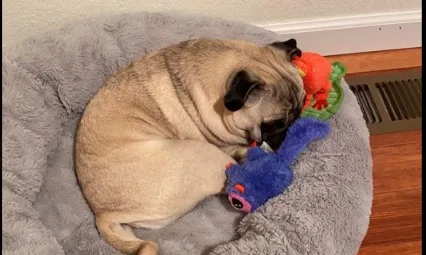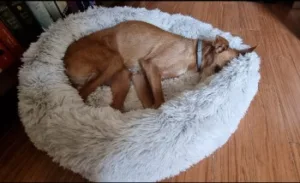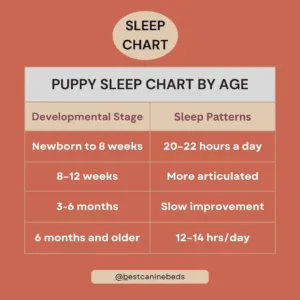Sleep is very important for dogs, as it directly influences their actual turn of events, mental turn of events, and emotional stability. Just like human babies, puppies need plenty of sleep to deal with new experiences, solidify learning, and re-energize their bodies for the following day’s experiences. Quality sleep promotes better behavior, better learning, and a stronger immune system, which lay the foundation for a healthy and happy life.
However, navigating dog sleep can raise many concerns and questions for pet owners. A common concern is whether their dog is getting enough sleep. Canines normally need 18 to 20 hours of sleep each day; however, individual necessities can change in light of breed, age, and action level. Understanding your canine’s sleep patterns and recognizing signs of exhaustion is critical to ensuring they are refreshed.
Another typical request revolves around establishing a rest-accommodating environment for canines. Giving a comfortable, quiet, and safe sleeping space is essential to advancing tranquil rest. This can be a comfortable container, a sensitive dog bed, or an assigned spot in a calm corner of the house. Consistency and routine are vital. Laying out a sleep time custom can help signal to your canine that now is the right time to slow down and go to bed.
It’s important to strike a balance between meeting your dog’s needs and encouraging independence. Gradually teaching your dog to relax and sleep through the night can help curb disruptive behaviors and promote a healthy sleep schedule for both you and your furry friend.
Section 1: Understanding Puppy Sleep Needs
Puppies are delightful balls of fluff with apparently interminable energy for playtime. However, as a general rule, these little, dear puppies need amazing sleep. This article should help you understand your canine’s rest patterns, comprehend the variables that influence their sleep needs, and address any worries you might have about their sleeping habits.
Exploring the Typical Sleep Patterns of Puppies
Dissimilar to grown-up canines, who commonly sleep 10–12 hours every day, pups are sleep champions. Young puppies, particularly those under about two months old, need 18–20 hours of sleep each day. This rest is vital for their actual development, mental turn of events, and general wellbeing.
As dogs mature, their sleep needs gradually decrease. At around 4 months of age, they may need around 14–16 hours of sleep. Even at this age, expect them to alternate between bursts of playful energy and periods of sleepiness.
Keep in mind: This is a general guideline, and individual dogs may sleep more or less depending on their breed, activity level, and temperament.
Factors Affecting Puppy Sleep Requirements
Some factors can affect how much sleep your dog needs:
- Age: As mentioned earlier, young dogs need significantly more sleep than older dogs.
- Breeds: Some breeds, such as Labrador retrievers, are known for their high energy levels and may sleep less than restful breeds, such as basset hounds.
- Activity Level:A puppy that spends a lot of time playing and exploring will naturally be more tired and need more sleep than a less active dog.
- Health:If your dog is sick, he may sleep more than usual. Conversely, discomfort caused by teeth or parasites can disturb their sleep.
Addressing Concerns About Excessive or Inadequate Sleep
Excessive sleep: While excessive sleep is normal, consult your veterinarian if your dog continues to feel lethargic even after getting enough rest.
Inadequate sleep: It is common for young puppies to wake up frequently during the night. However, if your dog continues to struggle to fall asleep or stay asleep through the night, talk to your vet to rule out any underlying medical problems and for tips on establishing a healthy sleep routine. Discuss the practical.
Section 2: Establishing a Puppy Sleep Schedule
Canines are bundles of unlimited energy, yet like human babies, they need a decent night’s rest to flourish. A predictable rest routine will guarantee that your fuzzy companion gets the sleep they need to remain healthy and happy. This guide will guide you through making a daytime sleep plan, progressing flawlessly into evening sleep, and changing schedules as your little dog develops.
Creating a Daytime Sleep Schedule
- Dog Power: Dogs, depending on age, can sleep up to 18 to 20 hours a day! The key is to schedule a predictable nap throughout the day.
- Crate Expectations: Consider crate-training your dog. Crates provide a safe and secure den-like environment that promotes calmness and sleep.
- Relax after playtime: After playtime or a walk, encourage your dog to sit down for a nap. This helps them burn off energy and make the connection between activity and rest.
Transitioning to Nighttime Sleep: Tips for Success
- Night owls no more: Lay out a steady sleep schedule that signals to your canine that now is the right time to slow down. This can incorporate a short walk, calm playtime, and a nestle meeting.
- Bathroom break: Take your canine out for one final bathroom break before bed to reduce the opportunity of nighttime mishaps.
- Area: Furnish your canine with a designated spot to rest, ideally somewhere quiet and dull.
Adjusting the Schedule as Your Puppy Grows
As your canine develops, their sleep needs to change. Step by step, change their rest and sleep timetables to mirror their expanded energy levels. Be steady, and your little pup will be a sleep genius in a matter of seconds!
Section 3: Puppy Sleep Chart by age: Age Milestones
Bringing back a charming pup is exciting, yet those adorable eyes can cause sleepless nights. This guide will plan your canine’s sleep process, offering knowledge into sleep designs at various formative stages, alongside normal difficulties and answers for each age.
Sleep Patterns at Different Developmental Stages
- Newborn to 8 weeks: Newborn puppies sleep 20–22 hours a day! They wake up to feed and eliminate, but spend most of their time in the deep sleep necessary for growth.
- 8–12 weeks: This is when you start to feel pinching. Canines can hold their bladders for longer time frames yet need continuous bathroom breaks, causing interruptions around night. Sleep cycles become more articulated, with times of dynamic rest and dreaming.
- 3-6 months: slow improvement! Canines can keep it up for longer, and with constant rest preparation, they can start sleeping from sunup to sundown. Expect to be tired during the day with a sleepy night.
- 6 months and older: Most puppies achieve a more complete sleep schedule by a year and a half, sleeping 12–14 hours per day. Naps are fewer, and nighttime sleep is more stable.
Dog Sleeping Positions When Sick
When dogs are unwell, their sleeping positions can change noticeably. Often, a dog sleeps in fetal position, curling up tightly to seek comfort and warmth, or they may stretch out in a flat position to ease discomfort. Paying attention to these shifts in sleeping behavior can help pet owners recognize signs of illness early and seek appropriate care for their furry friends.
When Can Puppies Sleep Through the Night?
There is no age for continuous sleep. Most canines can stay asleep from sundown to sunset for 4-6 months with appropriate preparation and schedule. Be that as it may, individual factors, for example, bladder control and separation anxiety, can influence this course of events.
Common Challenges and Solutions at Each Age
Newborn to 8 Weeks: Light on Warmth and Safety. Copy your mom’s glow with a warming cushion and comfy dog bed.
8–12 weeks: Bathroom preparation is important! Bathroom breaks before bed reduce nighttime accidents. Crate preparation can also provide comfort and protection.
3-6 months: Consistency is key! Create a sleep schedule that includes quiet play, bathroom breaks, and crate time. Ignore the crying and reward the calm demeanor.
6 months and beyond: Deal with residual difficulties such as separation anxiety by steadily increasing alone time during the day.
| Developmental Stage | Sleep Patterns | Common Challenges | Solutions |
|---|---|---|---|
| Newborn to 8 weeks | Newborn puppies sleep 20–22 hours a day. | Light on Warmth and Safety. | Mimic maternal warmth with a warming cushion and comfy bed. |
| 8–12 weeks | Puppies start to have more defined sleep cycles. | Bathroom training interruptions. | Establish regular bathroom breaks before bedtime; consider crate training. |
| 3-6 months | Sleep patterns show slow improvement, with longer periods of wakefulness. | Establishing Consistency. | Create a consistent sleep routine; reward calm behavior. |
| 6 months and older | Most puppies achieve a more stable sleep schedule, sleeping 12–14 hours per day. | Dealing with residual difficulties such as separation anxiety. | Gradually increase alone time during the day to address separation anxiety. |
Section 4: Tips for Improving Puppy Sleep
Those lovable, big, adorable eyes can be difficult to resist, yet a very refreshed canine is a happy canine! This is the way to make a sleep haven for your shaggy companion and ensure everybody gets a decent night’s rest:
Creating a Comfortable Sleep Environment
- Cozy Crate: Make the crate a safe haven with a comfortable bed, a soft blanket, and a familiar toy.
- Temperature control: Make sure the room is at a comfortable temperature, neither too hot nor too cold.
- Limited light: Darkness promotes sleep, so keep the area dimly lit at night especially if it’s your puppy first night with you.
- Location: Place the crate in a quiet area away from foot traffic and loud noises.
Encouraging Relaxation Before Bedtime
- Calm Daily schedule: Lay out a calm sleep time schedule that signals to your canine that now is the ideal time to slow down. This can incorporate short walks, calm playtime, and delicate brushing.
- Restricted food and water: Try not to give your canine a lot of food or an excess of water at sleep time to keep away from washroom breaks and possible mishaps.
- Exercise Need: Make sure your dog gets enough exercise during the day so that they are tired before bed.
Addressing Sleep Disruptions: Separation Anxiety, Nighttime Waking, etc.
- Separation Anxiety: On the off chance that your canine cries in this matter, address the problem gently. Start with short crate meetings with better feedback, and gradually increase the length.
- Late nighrt Waking: Ignore whining or yapping unless your canine really needs to be potted. Responding can lead to increased behavior.
- Teething pain: If teething is very painful, offer your canine a cool toy to relieve it.
Section 5 : The Importance of Prioritizing Puppy Sleep
Dogs are full of energy, but getting enough sleep is just as important to their health as playtime and exploration. Like us, sleep allows their bodies and minds to recharge, setting them up for optimal health and good behavior. Let’s explore the important connection between sleep and your furry friend’s development.
The Link Between Adequate Sleep and Physical Growth
During sleep, your dog’s body releases growth hormone, which is essential for building strong bones, muscles, and tissues. Without enough sleep, the production of this important hormone can be inhibited, potentially affecting their overall development.
Behavioral Benefits of Quality Sleep
A very refreshed canine is a more joyful canine. Sufficient sleep promotes better concentration, further develops learning and memory, and manages feelings. This results in a more settled disposition, a less damaging way of behaving, and greater teachability.
Tips for Balancing Playtime and Rest
Puppies have specific sleep needs that change as they grow. Here are some tips to make sure your furry friend gets the rest he needs:
- Establish a sleep schedule: Create a consistent bedtime routine, mimicking natural day-night cycles.
- Provide a comfortable crate: Make their crate a safe and comfortable place to sleep.
- Schedule playtime throughout the day: Regular exercise helps burn off their energy and tire them out by bedtime.
- Avoid over-stimulation before bed: Relaxing activities such as light petting before bedtime are better than rough accommodations.
Conclusion:
Pippies need a ton of rest, up to 18–20 hours per day for exceptionally youthful ones.
This sleep is significant in impacting their turn of events, mind capability, and resistant framework strength.
Focusing on your canine’s sleep is an interest in their general wellbeing and happiness. By permitting them the sleep they need, you are setting them up for a long period of prosperity. So the following time your shaggy companion crashes, fight the temptation to play—you’re assisting them with flourishing!
FAQs:
How much should puppies sleep by age?
- 8 weeks old: Expect 16 to 20 hours of sleep a day.
- 3 months old: They will likely sleep between 12 and 16 hours.
- 4 months old: Aim for 11 to 15 hours of sleep.
- 6 months and older: Your dog will be catching Zzzs for 10 to 14 hours a day.
At what age should a puppy sleep by itself?
Some dogs may be ready to go to sleep alone. Ideally, around 4 months of age (16 weeks) is a good time to transition them to sleeping independently.
How much does a 5 month old puppy sleep?
A 5-month-old dog needs a lot of rest, yet he is a pristine little pup. They, as a rule, expect around 10–11 hours of the day.
How long do 7 month old puppies sleep?
A 7-month-old puppy needs about 14–16 hours of sleep a day.
Is it OK for puppies to sleep a lot?
Just like human babies, puppies are developing quickly, and their bodies are continually developing. Obviously, it’s OK, yet a great deal of sleep is important for young dogs! As a matter of fact, they can rest more in the range of 18–20 hours every day.














